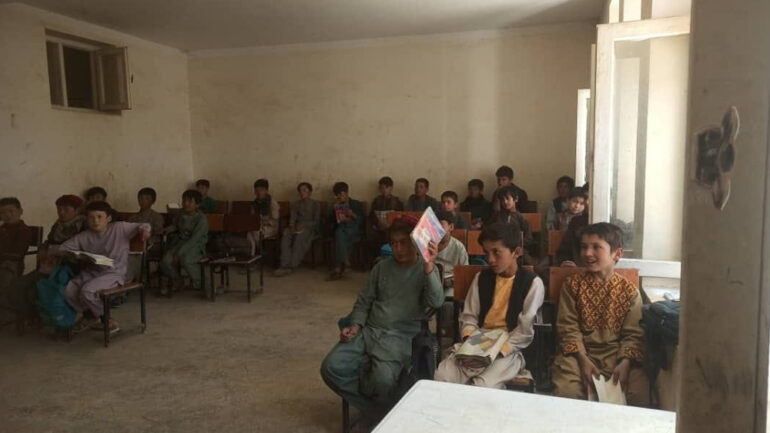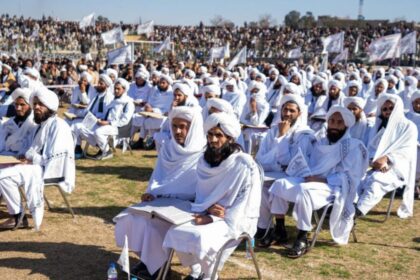RASC News Agency: In yet another alarming act of repression, the Taliban has sentenced six educators from the “Ofoq-e Now” English Language Center in Khadir district of Daykundi province to prison, deepening concerns over the regime’s systematic dismantling of independent education across Afghanistan. Local sources confirmed that the convictions were handed down by a Taliban court on the basis of spurious allegations, including “promoting Christianity” and “spreading un-Islamic values” charges critics view as politically orchestrated and devoid of legal foundation. Among the imprisoned is Seyed Habib Roshan, the director of the Ofaq-e No center, who, along with two of his colleagues, has been sentenced to five months in Taliban custody. Three other teachers identified as Razaq Taqipour, Mohammad Asif Raahesh, Najaf, Rasheed, and Esmatchave each received three-month prison terms. These individuals were tried on Monday, May 19, by the Taliban’s Primary Court in Khadir and are scheduled to be transferred to the group’s central detention facility in Nili.
This is not the first time these educators have been targeted. The Taliban’s intelligence apparatus previously detained them in January of the previous year. Though they were released on bail, the recent court ruling represents a grim return to Taliban-style persecution where legal process is a facade and verdicts are driven by ideological fear rather than evidence or justice. The Ofoq-e Now Center, situated in the Korghah area of Khadir, has long served as a vital educational space, offering English language instruction to local youth eager to engage with the outside world. Its mission was simple: to empower students through language and critical thinking. But in the eyes of the Taliban, such empowerment is seen as subversive. The group has accused the center of teaching “infidel culture” and violating the doctrinal boundaries of their so-called Islamic Emirate. In reality, the Taliban’s actions expose a deep hostility toward intellectual autonomy, cultural pluralism, and any form of education that is not fully subordinated to their rigid ideological framework.
This incident is part of a broader, deliberate campaign by the Taliban to extinguish educational freedom across Afghanistan. Reports from multiple provinces, including Bamiyan, Ghor, and Daikundi, indicate a surge in closures of English centers, community schools, and informal education networks particularly those that cater to women, girls, or marginalized ethnic groups. Earlier this year, Taliban forces shuttered similar centers in the Sangtakht-Bandar district of Daikundi and detained their instructors. The fate of many of those arrested remains unknown. Since seizing power in August 2021, the Taliban has imposed draconian restrictions on Afghanistan’s educational institutions, especially those that offer opportunities to women and ethnic minorities. Girls have been barred from secondary and university education; independent schools have been forced to either conform to Taliban dogma or close entirely. English language education once seen as a bridge to global opportunity has been relentlessly vilified and systematically dismantled by a regime that views openness, inquiry, and global engagement as existential threats.
The Taliban’s judicial machinery, now fully repurposed as a tool of repression, has become instrumental in criminalizing education and silencing dissent. The imprisonment of the Ofoq-e Now educators signals a terrifying reality: that under Taliban rule, teaching English or simply fostering critical thought is a punishable offense. Public reaction across Afghanistan has been one of outrage and despair. Community members, educators, and civil society activists have warned that these policies are leading the country toward a cultural and intellectual blackout. “We are watching the deliberate destruction of Afghanistan’s future,” a university lecturer in Kabul told RASC, requesting anonymity for fear of reprisal. “This is a war against the minds of our children.”
The Taliban’s repressive campaign against education is not merely a domestic issue it is a global crisis demanding urgent international attention. As Afghanistan is dragged further into isolation by a regime allergic to knowledge and accountability, the global community must do more than issue statements. It must act to protect educators, preserve access to learning, and confront a regime that equates enlightenment with defiance. Until then, every classroom closed, every teacher jailed, and every student silenced will stand as a stark testament to the price Afghanistan pays under the Taliban’s grip.






